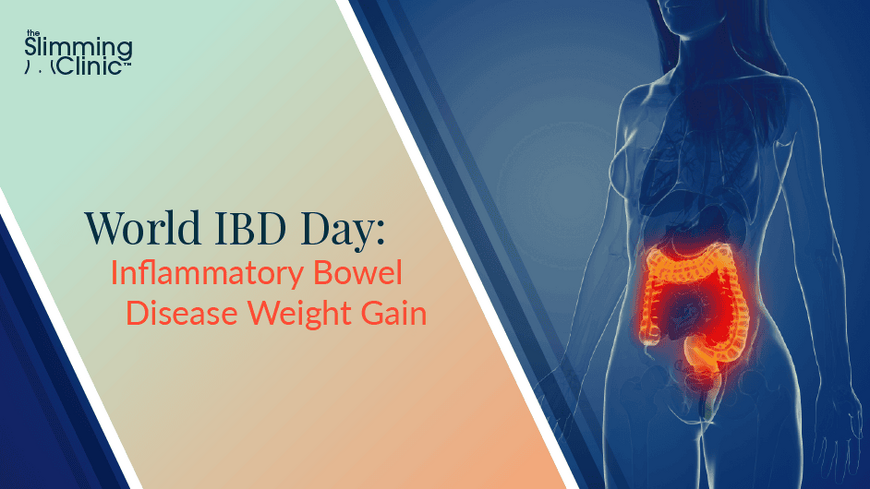World IBD Day: IBD Weight Gain
IBD Weight Gain: Causes, Diet Tips & When to Seek Help
Living with inflammatory bowel disease (IBD) comes with a range of challenges and for some, unexpected weight gain can be one of them. As we recognise World IBD Day, it's important to spotlight not just the physical symptoms of IBD, but also the broader health impacts that may go overlooked.
While weight loss is commonly associated with conditions like Crohn’s disease and ulcerative colitis, IBD weight gain is increasingly recognised among patients, particularly during periods of remission or medication use. In this blog, we’ll explore why this happens, how to support gut health through diet, and when to speak to a healthcare professional.
Why Does IBD Weight Gain Happen?
Contrary to popular belief, not everyone with IBD struggles with weight loss. In fact, studies have found a growing number of individuals with ulcerative colitis and Crohn’s disease experiencing weight gain due to:
- Corticosteroid use: Medications like prednisone can increase appetite and cause fluid retention.
- Reduced activity: Chronic fatigue and abdominal pain can make regular exercise challenging.
- Emotional eating: Stress and anxiety around flare-ups may lead to changes in eating patterns.
- Recovery periods: Once symptoms are controlled, caloric intake may remain high while energy needs decline.
GLP-1 medications like semaglutide are becoming popular options to help people with inflammatory bowel disease (IBD) manage their weight. These treatments not only support healthy weight loss, but may also reduce inflammation in the gut and improve overall disease symptoms. As explained in an article published in Gastroenterology & Hepatology, “GLP-1 agonists have wide-ranging immune effects, reducing macrophage migration and concentrations of proinflammatory cytokines,” which could help calm active IBD.
While some people may experience mild side effects such as nausea or changes in bowel habits, most tolerate the medication well. It's important to monitor muscle health during treatment, as some weight loss may include muscle mass, especially for IBD patients who are already at risk of sarcopenia (muscle loss). Despite these considerations, studies suggest GLP-1 medications can be a safe and effective part of a personalised weight management plan for individuals living with IBD and obesity.
Crohn's and Weight Gain: Is It Common?
Yes. Crohn’s and weight gain may occur when the condition is under better control or due to medication side effects. This can lead to frustration for those who worked hard to manage their symptoms but now face a new health concern. It’s important to monitor body composition and focus on fat-to-muscle ratios, rather than just numbers on the scale.
Ulcerative Colitis Weight Gain: Managing Without Restriction
With ulcerative colitis weight gain, nutritional balance is key. While avoiding trigger foods is important during flare-ups, overly restrictive eating can backfire during remission. The goal is to nourish the gut without overloading it.
Gut-friendly foods that support a healthy weight:
- Oats: A soluble fibre source that can soothe the gut and promote satiety.
- Lean protein: Chicken, turkey, tofu - supports muscle without added fat.
- Bananas & apples (peeled): Easy on the gut, full of nutrients.
- Fermented foods: Like kefir and yoghurt, can support the microbiome.
- Cooked vegetables: Easier to digest than raw versions.
Tips to Support Gut Health and Manage Weight
- Eat small, frequent meals to reduce gut strain.
- Stay hydrated - dehydration can mask itself as hunger.
- Keep a symptom and food diary to track what works for you.
- Get enough sleep - lack of rest affects metabolism and appetite.
- Move your body gently - walking, stretching, or yoga can support digestion.
When to Speak to a GP or Pharmacist
Unexplained weight gain, bloating, or discomfort should never be ignored. It’s important to rule out medication side effects, hormonal changes, or complications like strictures or inflammation. Your GP or pharmacist can:
- Review your current medications and suggest adjustments.
- Refer you to a dietitian specialising in IBD.
- Offer guidance on over-the-counter support for digestive health.
Living Well With IBD
Managing IBD is not just about avoiding flare-ups. It’s about building a lifestyle that works for your body through every phase, including periods of remission where weight changes might occur.
If you’re concerned about IBD weight gain, remember you’re not alone. Personalised support is available, whether you’re looking to improve your nutrition, adjust your medication, or better understand your body’s changes.
Take Control of IBD Weight Gain Today
Managing IBD weight gain is a personal journey and it doesn’t have to be done alone. Whether you're struggling with weight changes caused by medication, diet, or your condition itself, the right support can make all the difference.
Our team of weight management experts understand the unique challenges of living with Crohn’s, ulcerative colitis, and IBD. We’re here to help you feel healthier, more confident, and more in control of your body.
Here’s how we can support you:
- Book a Call Back - Speak to a specialist who understands IBD-related weight concerns and get personalised guidance.
- Order Online - Explore our medically approved weight management options to start your journey today.

World Bee Day: Honey for Weight Loss and the Natural Power of Bee...

Breaking Stereotypes & Celebrating Women’s Strength: International...

Good Things to Give Up for Lent for a Healthier You

2 Week Exercise Plan for Weight Loss for Beginners

Amazing Weight Loss Programme Discounts!

Get the lowdown on remote appointments!
Looking to start your weight loss journey, then take action today!
Book an appointment with one of our GMC-Registered Doctors who are weight loss experts and can ensure you get the best programme for you. Alternatively request your medication online using our online prescription service.



